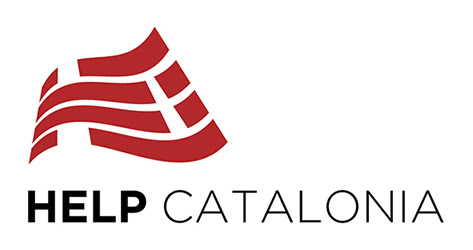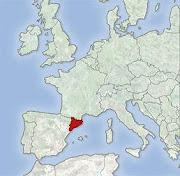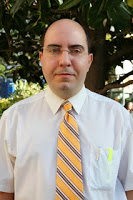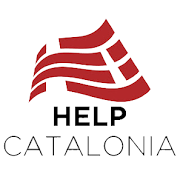We are visiting Àngel Colom, director of the
Fundació Nous Catalans (New Catalans Foundation), a few hours before the latest arrests of alleged recruiters of Jihadist combatants in Catalonia. He welcomes us in the organization's headquarters, located in the central quarter of Santa Coloma de Gramenet (Barcelona conurbation).

- La Razon (Madrid-based daily) has written on its front page (Catalan President) “Mas and Junqueras' New Catalans travel to Syria to join the IS”. Are you aware of anybody connected to the Foundation that you head being fighting in Syria?
Absolutely not. Neither fighting in Syria nor merely supporting Jihadism.
- La Razon also says that, according to counter-terrorism sources, there are 10-12 combatants from Catalonia in Syria, having emerged from the milieu of New Catalans and (second-largest Catalan party) ERC's immigration working group. Can you vouch for the fact this is not the case?
Long ago I learned not to vouch for anything or anybody. However, from what I know and from the work that we are doing with the Muslim community, I can state that all of this is a fabrication by this Spanish nationalist pamphlet. It is a lie.
- Maybe the
origin of the report lies in your tight connection with the Muslim community …
One thing
is the religion of Islam, as respectable as any other, and a different thing is
Islamist ideology. If, in Catalonia, there is an organization working to
ideologically combat radical Islamism and stand side by side with democrats
from the whole of Europe and all over the world, that is us. I do not know
whether La Razon is aware of this, but Spain's Interior Ministry and
security forces are.
- Why do
you believe that this report surfaced?
They try to
link the independence movement to Jihadism. It is one of their long-standing
obsessions.
- Who is
behind this?
- The PP
(Popular Party) administration, the CNI (National Intelligence Centre), and a
number of Madrid-based media outlets.
- Is there
any chance that somebody, who was connected to your Foundation at some specific
point in time, may have later radicalised?
If so, it
would be a very rare exception, but I am not aware and very much doubt it. The
people who come here know that they are working in a project whose values are
completely opposed to Jihadist Fascism. Therefore, I am very calm.
- Are there
Jihadists in Catalonia?
There is a
small radical minority, as in all over Europe. However, it is here where one
must distinguish Islamists from Muslims. I said earlier that I was not vouching
for anybody, but I do vouch for the huge majority of Muslim Catalans who have
nothing to do with Jihadism. Look, here we also have a minority of Catalan
Fascists of Catholic extraction who demonstrate on 12 October (Spanish national
day) in Montjuïc, and we do not stigmatize Catholic religion as a result.
- Are there
radical Imams in Catalonia?
Some.
- Do you
(the Foundation) know who they are?
Yes, and
sometimes we have reported them.
- Such as?
Abdelwahab
Houzi, an imam in Lleida (one of Catalonia's four provincial capitals, in the
West), who for years has been preaching an intolerant, mediaeval, sectarian
Islam. In the past the local council buttered him up a few times. Now he is
under greater control, but keeps preaching. Another case is an Imam in Reus
(Southern Catalonia) who comes and goes from the Netherlands, and in
Torredembarra (nearby town) they hold a gathering during Easter bringing
together 3,000 of the faithful, who listen to sermons by Imams from Kuwait and
Saudi Arabia. Furthermore, Spain's police and Civil Guard (constabulary-type
police) know it.
I
do not understand why the Spanish Government does not expel radical Imams
|
- And,
don't they do anything about it?
No. And I
wonder why, knowing what they do and having identified them, they do not arrest
and expel them. France and Italy do.
- What is
your response to this rhetorical question?
Look, the
current chairman of the Islamic Commission of Spain (officially recognized
umbrella organization), Mr Mounir Benjelloun Andaloussi Azhari, is somebody
ideologically close to Justice and Charity, a movement banned in Morocco.
- Banned?
It is
considered illegal and terrorist.
- Why?
It defends
deposing the King of Morocco and setting up a caliphate. Needless to say, this
is exactly what the IS defends. The thing is that a gentleman who supports
this movement is the representative of Muslims in Spain, with the green light
from the CNI and the PP administration.
- Have you
reported this?
I have
talked about this with European experts on Jihadism and they do not understand
anything. We find ourselves in a situation where the Spanish Government, which
is not working for the security of everybody, is accusing us, us who fight
radical Islamism, of connivance with radicalism.
- When
incidents such as those in Paris take place, a portion of Catalan society
demands a more robust public rejection by the Muslim community against
radicals' violence. Do you also miss that?
Years ago I
used to think this same way, and I thought that it had to be solved. Now,
thanks to extensive talks, Muslim communities have evolved in this direction.
After the Paris terror attacks there have been gatherings to condemn them, with
more than 80 Muslim communities from all over the country present, to denounce
those who claim to be acting in their name. It is true that no gathering
involving thousands of people has taken place. However, if it was necessary
some day, and I hope it is not necessary, it will take place. Do not doubt it.
- How is
the integration of Muslims in our country progressing?
For more than
one year we have been working on a National Plan to achieve a country-wide
agreement solving the fitting of Muslims into Catalonia. If we do it right, it
will serve the purpose of further isolating the tiny minority that radical
Islamists amount to.
I would
not accept a mosque financed by Qatar or Saudi Arabia
|
- Does a
way to make Muslims feel even more at home involve building Barcelona's famous
grand mosque?
For years I
have been defending the view that Barcelona cannot be the capital of the Mediterranean
if it lacks a grand mosque which is furthermore an architectural jewel.
- Do you
understand the reticence displayed by a portion of Catalan society when they
hear grand mosque and Barcelona? Not to mention this is a very attractive
issue, from a political perspective …
This will
come into being of its own accord. In very few years we should be able to lay
down the foundation stone of a mosque, of which I want to feel equally proud,
as the Catholic Catalan I am, as if it were Sagrada Familia and Santa Maria del
Mar (next to Fossar de les Moreres military cemetery, in Barcelona).
-What shall
we do with prejudices?
We must
leave them behind. Together with fears and political correctness.
- How
should the construction of this grand mosque take place?
The city's
local council, together with political parties, must initiate the setting up of
a consortium, with the participation of the countries of origin of most Catalan
Muslims.
- Are you
talking about Morocco?
With
Morocco and her King it is easy to talk, because they practice Maliki Islam,
very much compatible with European and Catalan values. I am also thinking,
however, of Senegal, Pakistan, Mali, and Bangladesh. All these countries may
take part in a consortium that would finance the grand mosque's construction.
Morocco, for example, has a specific plan that has already resulted in the
setting up of a number of mosques in European cities.
We
would prevent them from seeking to finance this place of worship and lay down
its ideology on the basis of an Islam contrary to European values
|
- And, what
would we get out of this?
We would
avoid the temptation by Saudi Arabia, Qatar, and the United Arab Emirates, to
seek to pay for this place of worship, laying down its ideology on the basis of
Wahhabi, Salafi Islam, which is opposed to European values.
- What if
they were the ones financing the mosque?
Just like I
squarely state that a grand mosque is necessary in Barcelona, I say that I am
completely against it if Qatar, Saudi Arabia, and the United Arab Emirates,
finance it.
- Why?
- They
would drive the practice of an Islam which is the root of present-day
radicalism. Our option must be a mosque with modern values of peace and
understanding, and with a school training the Imams who will later teach the Quran
in Catalan mosques. Concerning this, there must be no fear.
– What are you therefore expecting
from Barcelona City Council.
A brave
mayor who takes the bull by the horns, and political parties that properly
explain this to citizens.
- And what
are you expecting from the countries you mentioned earlier?
I have
talked about this with many of them, and they already agree. The issue has
moved forward a long way, and now it is necessary that someone take the first
step and that everything starts rolling. If we manage it, the radicalism that
may exist will gradually shrink until it becomes an anecdote.
The above
interview was conducted by Iu Forn, and published in elnacional.cat on 29 November
2015. The original, in Catalan, is available here. The text in brackets provides some
additional background information for international readers. Àngel Colom tweets
at @angelcolom, and the New Catalans Foundation at @NousCatalans. Translation
by Alex Calvo.
 "Pompeu Fabra always used to speak without much emphasis, in an almost colloquial manner. His explanations were absolutely clear and his scientific rigour, with a touch of irony here and there, and even, at times, jokes, was perfectly adapted to his educational intentions. He did not want to be seen as brilliant, he wanted to communicate and persuade. The wise man masqueraded as the professor […]"
"Pompeu Fabra always used to speak without much emphasis, in an almost colloquial manner. His explanations were absolutely clear and his scientific rigour, with a touch of irony here and there, and even, at times, jokes, was perfectly adapted to his educational intentions. He did not want to be seen as brilliant, he wanted to communicate and persuade. The wise man masqueraded as the professor […]"
























